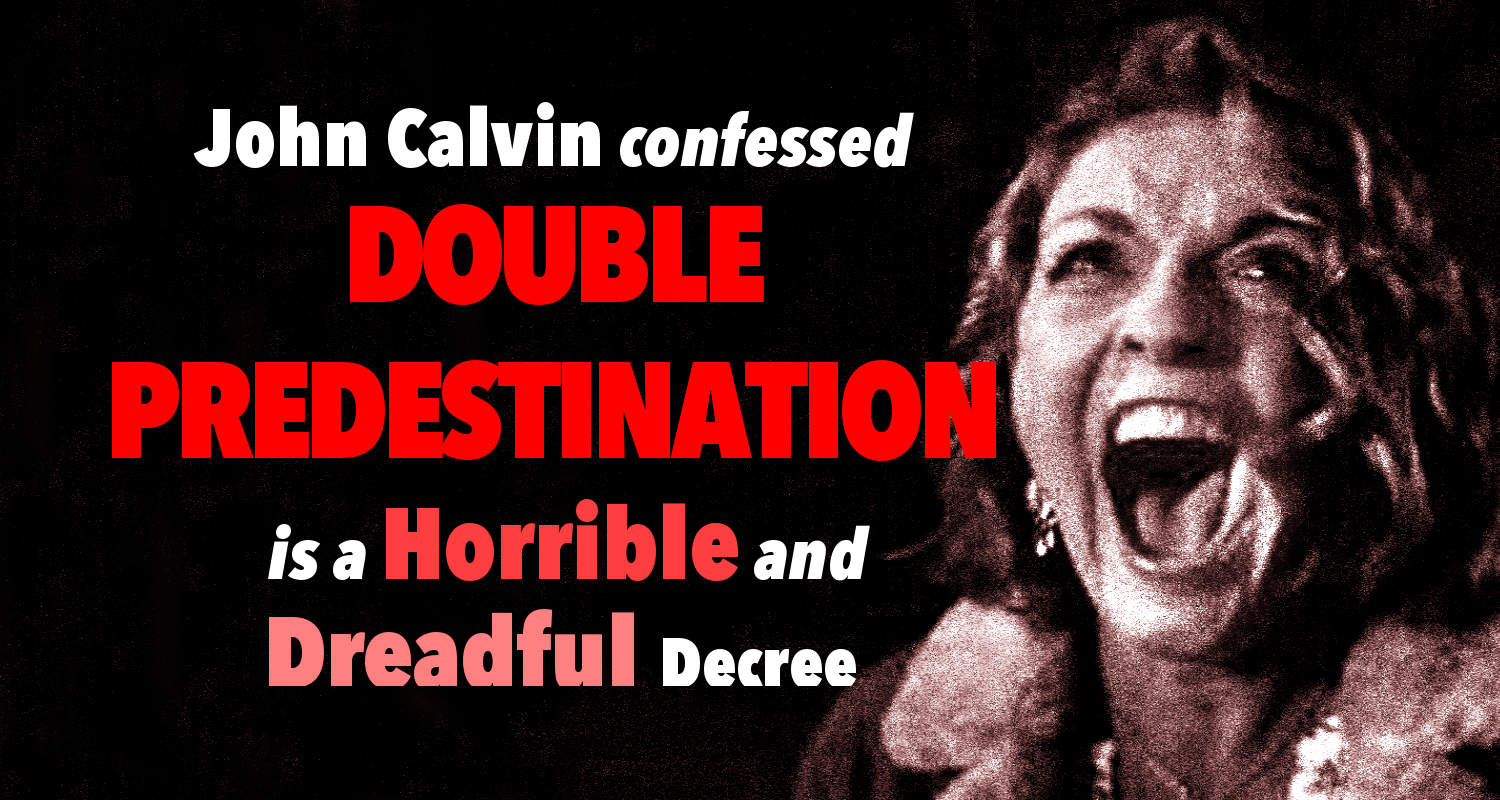




~ Updated and Revised: February 26th, 2019 ~
John Calvin confessed that the doctrine of Double Predestination was a horrible and dreadful decree in his Institutes of the Christian Religion. Calvin believed that the scriptures taught that God made an "absolute decree" (latin. decretum absolutum) before the foundation of the world that all people would be divided into two classes of the elect and the reprobate that was determined by God's decision alone.
Unlike many Calvinists today, Calvin believed that God's absolute decree to predestine an individual to eternal death was not a wonderful or glorious thing, instead Calvin confessed that it was a dreadful and horrible decree. Is it not a horrible decree that God would create something for eternal perdition? And it is dreadful and horrible indeed! How could we respond in any other way than to say such a final ends is horrible and dreadful! The possibility that God would create any person for eternal death calls into question the goodness of God. The best Calvinists scholars who affirmed Calvin's doctrine of double predestination admit that is a "mystery" how God may make such an absolute decree and predestine anyone to hell. I agree that there are many dreadful and horrible doctrines, and it may not be possible to understand how they glorify god, because we see through a mirror dimly or hear them in an enigmatic word. (1 Cor 13:12).
John Calvin on the "horrible" and "dreadful" absolute decree of God
The following two quotations are from the Institutes of the Christian Religion where John Calvin explicitly calls the absolute decree (decretum absolutum) a "dreadful" and "horrible" decree!
Again I ask: whence does it happen that Adam's fall irremediably involved so many peoples, together with their infant offspring, in eternal death unless because it so pleased God? Here their tongues, otherwise so loquacious, must become mute. The decree is dreadful indeed, I confess. (latin. "Decretum quidem horribile, fateor."; french. "Je confesse que ce decret nous doit epouvanter.") Yet no one can deny that God foreknew what end man was to have before he created him, and consequently foreknew because he so ordained by his decree. If anyone inveighs against God's foreknowledge at this point, he stumbles rashly and heedlessly. What reason is there to accuse the Heavenly Judge because he was not ignorant of what was to happen? If there is any just or manifest complaint, it applies to predestination. And it ought not to seem absurd for me to say that God not only foresaw the fall of the first man, and in him the ruin of his descendants, but also meted it out in accordance with his own decision. For as it pertains to his wisdom to foreknow everything that is to happen, so it pertains to his might to rule and control everything by his hand. And Augustine also skillfully disposes of this question, as of others: "We most wholesomely confess what we most correctly believe, that the God and Lord of all things, who created all things exceedingly good [cf. Gen 1:31], and foreknew that evil things would rise out of good, and also knew that it pertained to his most omnipotent goodness to bring good out of evil things to be . . . , so ordained the life of angels and men that in it he might first of all show what free will could do, and then what the blessing of his grace and the verdict of his justice could do. (Augustine, On Rebuke and Grace X. 27)". [1]
For as soon as God's dread majesty (latin. "horribilis dei maiestas") comes to mind, we cannot but tremble and be driven far away by the recognition of our own unworthiness, until Christ comes forward as intermediary, to change the throne of dreadful glory into the throne of grace. As the apostle also teaches how we should dare with all confidence to appear, to receive mercy, and to find grace in timely help (Heb 4.16). And as a rule has been established to call upon God, and a promise given that those who call upon him shall be heard, so too we are particularly bidden to call upon him in Christ's name; and we have the promise made that we shall obtain what we have asked in his name. "Hitherto," he says, "you have asked nothing in my name; ask and you will receive." (John 16:24, comm.) "In that day you will ask in my name" (John 16:26, Vg.), and "whatever you ask . . . I will do it that the Father may be glorified in the Son" (John 14:13, cf. Comm. and Vg.) [2]
Karl Barth's response to John Calvin
The best response to John Calvin is Karl Barth's reconstruction of Calvin's doctrine of double predestination. Karl Barth affirmed Calvin's absolute decree, but reoriented it around Jesus Christ, and Barth taught that Jesus is the one and only elected one and rejected one (reprobate), and all people are rejected and elected in Jesus Christ (Eph 1:4). Karl Barth transforms Calvin's doctrine of election from a horrible and dreadful decree into a doctrine of election that is a sum of the Gospel! Barth's doctrine of double predestination provides hope for universalism too because we are all criminals with Jesus (just as John Calvin had universalist flashes throughout his Institutes of the Christian Religion too). I believe Karl Barth is right to believe John Calvin would be grateful for his help, as we all may be today.
Sources:
1. John Calvin, Institutes of the Christian Religion III.xxiii.7 (The Library of Christian Classics), trans. Ford Lewis Battles, Westminster John Knox Press (January 1, 1960), pg 955-956
3. Header image of woman screaming (source: wikipedia)